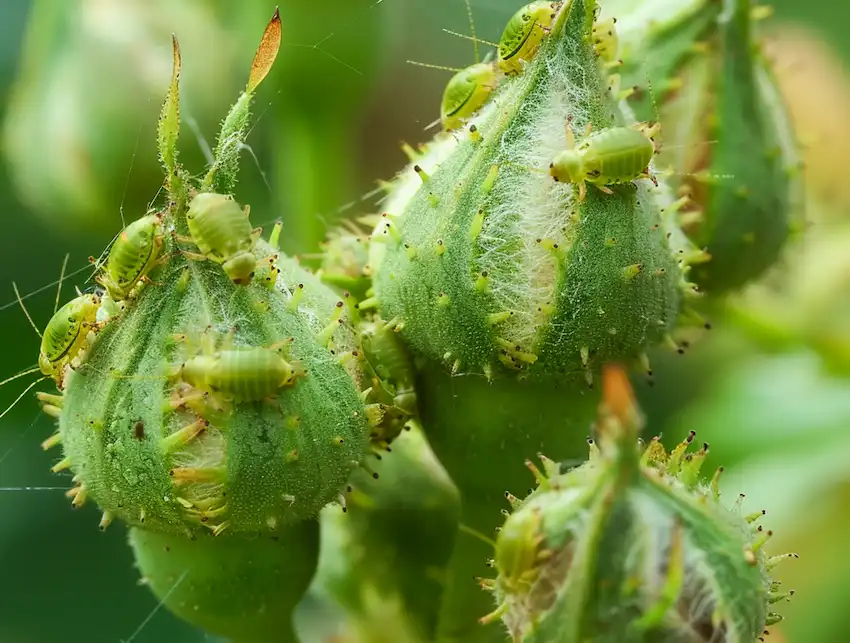Natural and Simple Methods to Combat Aphids and Scale Insects in Your Garden
Aphids and scale insects are notorious pests that can cause significant damage to garden plants, leading to reduced growth and increased susceptibility to diseases. Thankfully, there are several natural and straightforward strategies to manage and eliminate these pests effectively without the need for harsh chemicals. This guide will explore various methods to protect your plants and maintain a thriving garden.
Understanding Aphids and Scale Insects
Aphids
- Appearance: Small, soft-bodied insects, usually green, black, or brown, with a pear-shaped body and long legs.
- Damage: Suck sap from plants, causing stunted growth, curling leaves, and the spread of sooty mold.
Scale Insects
- Appearance: Small, immobile insects that appear as bumps or scales on plant stems and leaves. They can be hard or soft and often resemble small, waxy or shield-like formations.
- Damage: Feed on plant sap, leading to yellowing leaves, reduced vigor, and sometimes the death of the plant.
Natural Methods to Control Aphids and Scale Insects
1. **Beneficial Insects
- Ladybugs: Ladybugs are natural predators of aphids. Introducing them into your garden can help keep aphid populations in check.
- Lacewings: Lacewing larvae feed on aphids and scale insects, making them another effective predator.
- Parasitic Wasps: Tiny wasps, such as Aphidius spp., parasitize aphids, helping to control their numbers.
How to Use:
– Purchase beneficial insects from garden centers or online.
– Release them in your garden according to the instructions provided.
2. **Neem Oil
- How It Works: Neem oil disrupts the life cycle of aphids and scale insects by inhibiting their ability to feed and reproduce.
- Application: Mix neem oil with water according to the manufacturer’s instructions and spray it on affected plants, covering both sides of the leaves.
Benefits:
– Natural and safe for most plants and beneficial insects.
– Effective against a wide range of pests.
3. **Insecticidal Soap
- How It Works: Insecticidal soap targets soft-bodied insects like aphids by breaking down their protective outer layer, leading to dehydration and death.
- Application: Spray a solution of insecticidal soap and water onto affected areas of the plant, ensuring thorough coverage.
Benefits:
– Safe for most plants and beneficial insects.
– Breaks down quickly and does not leave harmful residues.
4. **Horticultural Oil
- How It Works: Horticultural oil smothers scale insects and aphids by coating them and preventing them from breathing.
- Application: Dilute horticultural oil according to the instructions and spray it on infested plants. Apply during the dormant season to target overwintering scale insects.
Benefits:
– Effective against both adults and eggs.
– Minimal impact on beneficial insects when used properly.
5. **Natural Predators
- Predatory Beetles: Certain beetles, such as the predatory beetle (Stethorus punctillum), can help control aphid populations.
- Nematodes: Beneficial nematodes are microscopic worms that can help control soil-dwelling insect pests, including some scale insects.
How to Use:
– Introduce predatory beetles or nematodes to your garden based on the specific pest problem and the instructions provided.
6. **Manual Removal
- Aphids: Gently rinse affected plants with water to dislodge aphids, or use a soft brush to remove them.
- Scale Insects: Scrape off scale insects manually using a brush or a cloth soaked in soapy water.
Benefits:
– Immediate and direct control of pests.
– Useful for small infestations or hard-to-reach areas.
Prevention Tips
- Maintain Plant Health: Healthy plants are more resistant to pests. Ensure proper watering, fertilization, and soil conditions.
- Regular Inspection: Regularly check your plants for signs of pests and address issues promptly.
- Companion Planting: Grow companion plants that repel aphids or attract beneficial insects, such as marigolds or dill.
Conclusion
Aphids and scale insects can pose significant challenges to garden health, but with the right natural methods, you can effectively manage and eliminate these pests. By utilizing beneficial insects, neem oil, insecticidal soap, horticultural oil, and manual removal, you can protect your plants and maintain a healthy garden environment. Incorporating preventative measures and regular inspections will further enhance your garden’s resilience against these common pests.

